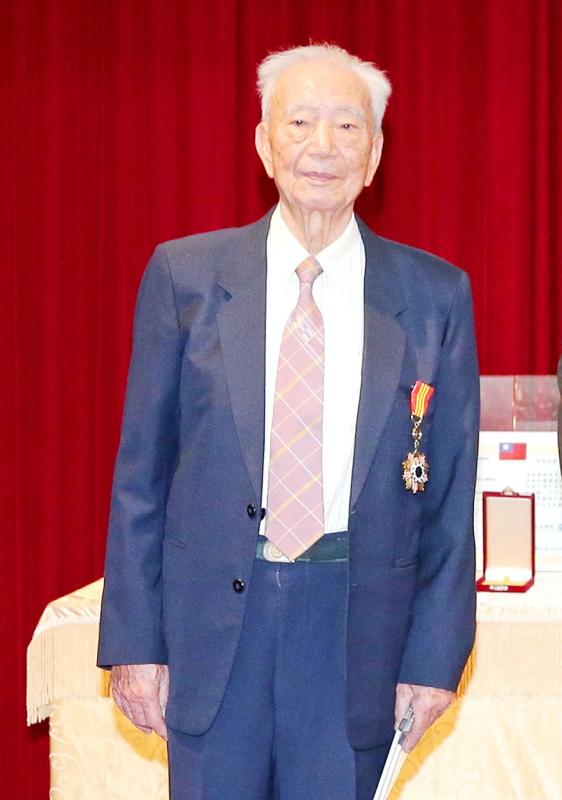Lien Jih-ching (連日清), an entomologist and public health expert who helped in the effort to have the WHO in 1965 declare Taiwan to be “malaria free,” died on Wednesday.
He was 96.
Born in Taipei’s Dadaocheng (大稻埕) area, Lien’s connection with mosquito studies began at age 15 when he worked part-time at the Tropical Medicine Research Institute at what was at the time Taihoku Imperial University, now National Taiwan University.

Photo courtesy of the Ministry of Foreign Affairs
Lien worked for Omori Nanzaburo, a Japanese entomologist, helping him to develop prevention strategies and treatments for dengue fever.
During a dengue fever outbreak in Taiwan in 1942, an estimated 5 million out of Taiwan’s population of 8 million at the time caught the disease, Lien among them.
He later said that the experience had inspired him to become an expert in mosquitoes and other insects.
Lien led a team that researched malaria prevention strategies to eradicate the disease in Taiwan.
After the WHO declaration, Lien turned his focus to dengue fever and continued to study mosquitoes, the primary vector of both diseases.
Lien is credited with the first documentation of 1 percent of all mosquito species in the world.
Tsai Kun-hsien (蔡坤憲), a professor at the National Taiwan University’s College of Public Health who worked with Lien on several overseas medical entomology missions, yesterday said that Lien never shied from his work even after contracting scrub typhus.
Even in his 80s, Lien led missions to Sao Tome and Principe, which was a diplomatic ally of Taiwan at the time, to help eradicate malaria there and train local public health personnel.
Council of Agriculture Minister Chen Chi-chung (陳吉仲) yesterday expressed his condolences to Lien’s family.
Chen lauded Lien’s contributions to entomology, public health and medicine.
The council would ask President Tsai Ing-wen (蔡英文) to present an order of praise and commendation to honor Lien’s contribution to Taiwan and the world, Chen said.

POSITIVE DEVELOPMENT: Japan and the US are expected to hold in-depth discussions on Taiwan-related issues during the meeting next month, Japanese sources said The holding of a Japan-US leaders’ meeting ahead of US President Donald Trump’s visit to China is positive news for Taiwan, former Japan-Taiwan Exchange Association representative Hiroyasu Izumi said yesterday. After the Liberal Democratic Party’s landslide victory in Japan’s House of Representatives election, Japanese Prime Minister Sanae Takaichi is scheduled to visit the US next month, where she is to meet with Trump ahead of the US president’s planned visit to China from March 31 to April 2 for a meeting with Chinese President Xi Jinping (習近平). Japan and the US are expected to hold in-depth discussions on Taiwan-related issues during the

‘LIKE-MINDED PARTNER’: Tako van Popta said it would be inappropriate to delay signing the deal with Taiwan because of China, adding he would promote the issue Canadian senators have stressed Taiwan’s importance for international trade and expressed enthusiasm for ensuring the Taiwan-Canada trade cooperation framework agreement is implemented this year. Representative to Canada Harry Tseng (曾厚仁) in an interview with the Central News Agency (CNA) said he was increasingly uneasy about Ottawa’s delays in signing the agreement, especially as Ottawa has warmed toward Beijing. There are “no negotiations left. Not only [is it] initialed, we have three versions of the text ready: English, French and Mandarin,” Tseng said. “That tells you how close we are to the final signature.” Tseng said that he hoped Canadian Prime Minister Mark Carney

President William Lai (賴清德) yesterday bestowed one of Taiwan’s highest honors on Saint Vincent and the Grenadines (SVG) Ambassador Andrea Clare Bowman in recognition of her contributions to bilateral ties. “By conferring the Order of Brilliant Star with Grand Cordon on Ambassador Bowman today, I want to sincerely thank her, on behalf of the Taiwanese people, for her outstanding contribution to deepening diplomatic ties between Taiwan and SVG,” Lai said at a ceremony held at the Presidential Office in Taipei. He noted that Bowman became SVG’s first ambassador to Taiwan in 2019 and

A man walks past elementary school artworks at the Taipei Lantern Festival in Ximen District yesterday, the first day of the event. The festival is to run from 5pm to 10pm through March 15.